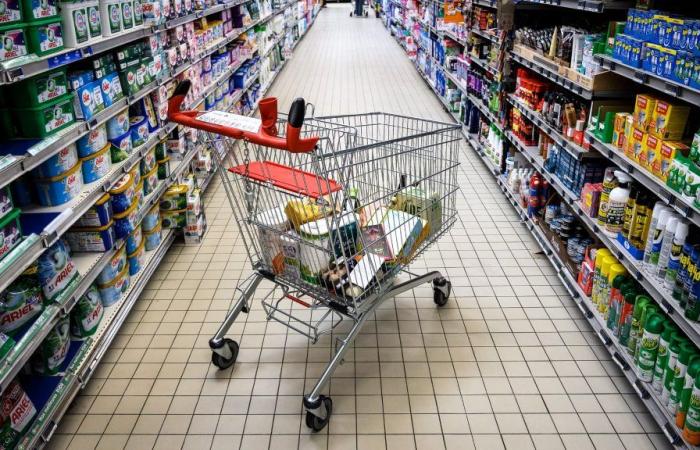Nana hygiene products, Lu biscuits, Pepsi soda… Regularly, consumers notice that the shelves which usually house their favorite products are empty. How is this phenomenon explained?
Entire shelves emptied of products. Consumers regularly observe that their favorite brands suddenly disappear from their supermarket. We saw this for the products of the brands of the PepsiCo group (Lays, Doritos, Pepsi, 7up…) at the start of the year at Carrefour or even for those of the Mondelez group (Lu, Milka, Belin…) since more than three months at Système U and Leclerc.
How can we explain that these out of stock products are not restocked? RMC Conso explains.
More Nana and Tena products at Leclerc
A few days ago, mass distribution specialist Olivier Dauvers published a post on X showing a poster placed in the hygiene section of the Leclerc store in Marmoutier, in Bas-Rhin.
“The Nana and Tena brands are no longer available in your store following a significant and unjustified price increase from the company Essity,” announces the poster.
We understand that Leclerc has decided to delist the brands of this leader in hygiene due to a disagreement over prices.
There are many possible reasons for the delisting of a product on the shelves: a brand that does not sell enough, a quality problem detected after numerous recalls or consumer complaints, a desire to renew by changing the offer. .
Quarrel between brand and brand
But on products from well-known brands, and particularly during periods of inflation, the source of delisting is quite different. Most of the time, it is a quarrel between distributor and manufacturer.
Every year, usually between December and March (although they have been brought forward to January this year), negotiations take place between manufacturers and large retail chains to determine the prices of foodstuffs and consumer products for the year to come. Commercial events, promotional operations, etc. are also decided.
Obviously, distributors want to buy brand products at the lowest possible price, to then be able to apply attractive prices in their stores, be competitive with their competitors and thus attract consumers.
In the price war that brands have been waging for several years to be the cheapest on the market, the stakes of these commercial negotiations are crucial.
If the Nana and Tena products have disappeared from Leclerc shelves, it is either because Leclerc did not manage to reach an agreement with Essity on prices in January, “or because Essity applied a revision clause to increase its prices, because during annual negotiations the prices are not fixed for the whole year and can fluctuate depending on increases in the prices of raw materials”, Olivier Dauvers explains to RMC Conso.
Dereferencing, a negotiation weapon
Result: Leclerc may have decided not to repurchase the Nana and Tena products, or Essity may have decided to no longer supply Leclerc.
“We can never know who is behind the decision. The commercial relationship is not necessarily completely broken, the brand can simply decide not to repurchase temporarily, or to order less,” adds the expert from the consumption.
The idea of rationalizing purchases rather than completely delisting a brand, as a means of putting pressure on manufacturers, was also mentioned by Thierry Cotillard, boss of Mousquetaires/Intermarché, in an interview with the newspaper Ouest-France in January: “We could rationalize the assortments (…) If a national brand has 100 products, if it is not reasonable, perhaps 60 products will be enough,” he then suggested.
But why is the disappearance of these products from the shelves only visible now, six months after the end of the negotiations? Quite simply because there is always a lag between the moment when the product is delisted and the moment when the consumer is impacted, the time for the previous year’s stocks to run out.
“For hygiene products that keep for a long time, stocks are often larger so it can take months to empty the warehouses. And it is now that the stocks are empty that the brand begins to be penalized,” notes Olivier Dauvers.
“We also see it on the biscuit aisle: Leclerc is suffering from the dispute with Mondelez.”
Blackmail difficult to prove
If dereferencing in itself is legal, abusive dereferencing can however be denounced in court. Blackmail is theoretically illegal.
According to the platform specializing in commercial performance Sidely, the commercial code prohibits “obtaining or attempting to obtain, under the threat of a sudden, total or partial termination, commercial relations, prices, payment terms, terms of sale or conditions of commercial cooperation that clearly deviate from the general conditions of sale.
However, such abuse is almost impossible to demonstrate, according to Olivier Dauvers:
“The principle of commercial freedom means that a brand has every right to no longer order a product. To my knowledge, there is no case law on the subject.”
In any case, neither distributor nor manufacturer has any interest in this type of bickering lasting too long. The brand needs the brand to distribute its products, and the brand needs the brand to diversify its offering and retain its customers. The consumer who sees a product he cares about disappear risks going to buy it elsewhere. Industrialist and distributor are therefore interdependent.
“It’s like a couple, jokes Olivier Dauvers. In general, what happens is that after three or four months, each takes a step towards the other, because each needs the other to exist.”
Don’t worry, your favorite products will always come back eventually.






